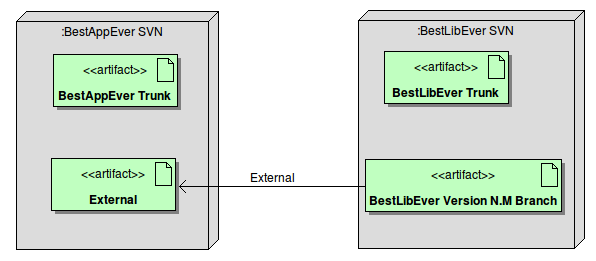Last time we finally solved the varargs problem. Let's review what we learned:
- Variadic templates let us create something receiving a variable set of arguments
- We can process the head of that set, then recursively process the tail
- It adds weird new syntax
- When declaring typename... T you are saying "here goes a list of types"
- When declaring T... t you are saying t is a list of objects with different type
- When you write t..., you are saying "expand the list of arguments"
- It's type safe
- It's very neat to confuse your coworkers
So, what can we do with it besides implementing our own version of printf? Let's do something better, let's try adding up a list of numbers to start flexing our variadic templatefooness (?).
What's the usual way of adding a list of numbers? In templates, that is. We need something like this:
sum (H:T) <- H + sum(T)
sum () <- 0
Of course, in C++ templates you don't have values, you just have types. We could implement it like this (if this looks like a new language you may want to check my template metaprogramming series):
#include <iostream>
struct Nil{};
template <typename H, typename T=Nil> struct Lst {
typedef H Head;
typedef T Tail;
};
template <
template<typename A, typename B> class Op,
typename Head,
typename Lst>
struct intForeach
{
typedef typename intForeach
< Op, typename Lst::Head, typename Lst::Tail >::result Next;
typedef typename Op< Head, Next >::result result;
};
template <
template<typename A, typename B> class Op,
typename Head>
struct intForeach <Op, Head, Nil>
{
typedef Head result;
};
template <
typename Lst,
template<typename A,
typename B>
class Op>
struct Reduce
{
typedef typename intForeach
< Op, typename Lst::Head, typename Lst::Tail >::result result;
};
template <int N> struct Num {
const static int value = N;
};
template <typename A, typename B> struct Sum {
static const int r = A::value + B::value;
typedef Num<r> result;
};
int main() {
std::cout << Reduce<
Lst<Num<2>, Lst<Num<4>, Lst<Num<6>, Lst< Num<8> > > > >,
Sum >::result::value << "n";
return 0;
}
Nothing too fancy, plain old recursion with a sum. Yet it's quite verbose, can we make this a little bit more terse and, hopefully, more clear? Yes, we can. Take a look at that Lst, Lst<...> It sucks. And it's the perfect place to use variadic templates, we just need to construct a structure getting a list of ints, like this:
template <
// The operation we wish to apply
template<typename A, typename B> class Op,
// Current element to process
class H,
// All the rest
class... T>
struct Reduce_V
{
// TODO
}
That one should look familiar from last time article. Now, to implement a reduce operation we need to operate the current element with the result of reducing the tail, so we have to do something like this:
// Remember how T... means to expand T for the next instance
typedef typename Reduce_V<Op, T...>::result Tail_Result
There's something missing. Can you see what? The ending condition, of course. Let's add it and we'll get something like this:
template <
// The operation we wish to apply
template<typename A, typename B> class Op,
// All the rest
class... T>
struct Reduce_V
{
};
template <
// The operation we wish to apply
template<typename A, typename B> class Op,
// All the rest
class H>
struct Reduce_V<Op, H>
{
typedef H result;
};
template <
// The operation we wish to apply
template<typename A, typename B> class Op,
// Current element to process
class H,
// All the rest
class... T>
struct Reduce_V<Op, H, T...>
{
// Remember how T… means to expand T for the next instance
typedef typename Reduce_V<Op, T...>::result Tail_Result;
// Reduce current value with the next in line
typedef typename Op<H, Tail_Result>::result result;
};
And using it is very simple too:
std::cout << Reduce_V< Sum, Num<1>, Num<2>, Num<3>, Num<4>>::result::value << "n";
Next time we'll see another example for variadic templates and a new C++0x feature.



